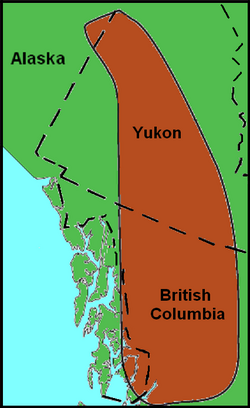Northern Cordilleran Volcanic Province
NCVP | |
|---|---|
 Mount Edziza, a stratovolcano in the province | |
 Map of northwestern North America. The Northern Cordilleran Volcanic Province is highlighted brown. | |
| Location | British Columbia, Canada |
The Northern Cordilleran Volcanic Province (NCVP), formerly known as the Stikine Volcanic Belt,[1] is a geologic province defined by the occurrence of Miocene to Holocene volcanoes in the Pacific Northwest of North America. This belt of volcanoes extends roughly north-northwest from northwestern British Columbia and the Alaska Panhandle through Yukon to the Southeast Fairbanks Census Area of far eastern Alaska, in a corridor hundreds of kilometres wide. It is the most recently defined volcanic province in the Western Cordillera.[1] It has formed due to extensional cracking of the North American continent—similar to other on-land extensional volcanic zones, including the Basin and Range Province and the East African Rift. Although taking its name from the Western Cordillera, this term is a geologic grouping rather than a geographic one. The southmost part of the NCVP has more, and larger, volcanoes than does the rest of the NCVP; further north it is less clearly delineated, describing a large arch that sways westward through central Yukon.
At least four large volcanoes are grouped with the Northern Cordilleran Volcanic Province, including Hoodoo Mountain in the Boundary Ranges, the Mount Edziza volcanic complex on the Tahltan Highland, and Level Mountain and Heart Peaks on the Nahlin Plateau. These four volcanoes have volumes of more than 15 km3 (3.6 cu mi), the largest and oldest which is Level Mountain with an area of 1,800 km2 (690 sq mi) and a volume of more than 860 km3 (210 cu mi).[2] Apart from the large volcanoes, several smaller volcanoes exist throughout the Northern Cordilleran Volcanic Province, including cinder cones which are widespread throughout the volcanic zone. Most of these small cones have been sites of only one volcanic eruption; this is in contrast to the larger volcanoes throughout the volcanic zone, which have had more than one volcanic eruption throughout their history.
The Northern Cordilleran Volcanic Province is part of an area of intensive earthquake and volcanic activity around the Pacific Ocean called the Pacific Ring of Fire. However, the Northern Cordilleran Volcanic Province is commonly interpreted to be part of a gap in the Pacific Ring of Fire between the Cascade Volcanic Arc further south and the Aleutian Arc further north.[3] But the Northern Cordilleran Volcanic Province is recognized to include over 100 independent volcanoes that have been active in the past 1.8 million years. At least three of them have erupted in the past 360 years, making it the most active volcanic area in Canada.[4] Nevertheless, the dispersed population within the volcanic zone has witnessed few eruptions due to remoteness and the infrequent volcanic activity.
- ^ a b Edwards, Benjamin R.; Russell, James K. (August 2000). "Distribution, nature, and origin of Neogene-Quaternary magmatism in the northern Cordilleran volcanic province, Canada" (PDF). Geological Society of America Bulletin. pp. 1280, 1286, 1287, 1290, 1291, 1292, 1293. Retrieved 2009-10-02.
- ^ "Level Mountain". Global Volcanism Program. Smithsonian Institution. Retrieved 2009-03-30.
- ^ Cite error: The named reference
JKwas invoked but never defined (see the help page). - ^ "Stikine volcanic belt". Catalogue of Canadian volcanoes. Geological Survey of Canada. 2008-02-13. Archived from the original on 2008-06-15. Retrieved 2009-10-01.